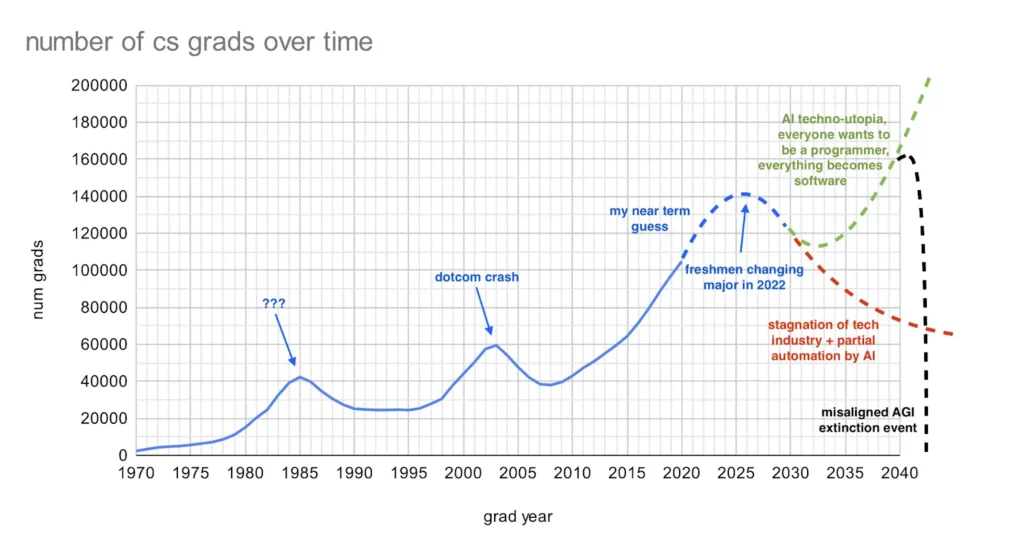For many, a computer science degree was once a golden ticket to a high-paying career in software engineering. But in recent years, whispers of a slowdown in the industry have caused some to wonder: Is the software engineering boom over?
This question is especially relevant for aspiring coders. Fear not – while the job market might be shifting, it’s not disappearing. Let’s delve into the future of software engineering jobs and how to thrive in this evolving landscape.

Number of CS Grads Over Time
The y-axis shows the number of graduates, while the x-axis shows the year. The data extends from 1970 to 2020.
The graph suggests a steady increase in the number of CS graduates over the past few decades. There is a significant spike in the number of graduates around the year 2000, which coincides with the dot-com boom. The graph predicts a continued rise in the number of CS graduates in the coming years.
Text overlaid on the graph speculates on what might cause the number of CS graduates to level off or decline. These reasons include stagnation in the tech industry, partial automation by AI, and a “misaligned AGI extinction event.”
It is important to note that the data in the graph only goes up to 2020. According to a recent article on reddit, the number of bachelor’s degrees awarded in computer science in the United States continued to grow in 2021. There were 104,874 bachelor’s degrees awarded in 2021, which is an 8% increase from 2020. This suggests that the upward trend in the number of CS graduates is likely to continue.
A Changing Landscape: Are Fewer Software Engineers Needed?
There’s some evidence that the hiring landscape for software engineers is changing. A graph by Deedy Das of Menlo Ventures suggests a decrease in hiring since its peak in 2021. Here are two potential reasons:
- The Rise of Artificial Intelligence (AI): AI is automating some tasks previously done by human engineers, raising concerns about job displacement.
- Experience Matters: Startups, once known for taking chances on new graduates, are now reportedly favoring developers with proven experience.
The Future Isn’t All Doom and Gloom: Why Software Engineering Jobs Will Remain Relevant
However, before you abandon your coding dreams entirely, consider this: experts like Francois Chollet, creator of Keras, predict an increase in the number of software engineers in the coming years. Here’s why:
- The Ever-Growing Tech Tide: As more and more industries embrace technology, the overall demand for software solutions is likely to continue growing.
- AI as a Co-Pilot, Not a Replacement: While AI might automate some tasks, it’s unlikely to replace the creativity and problem-solving skills of human engineers. Instead, AI could become a valuable tool, working alongside developers to boost productivity.
The Key to Success: Adapting Your Skillset to Stay Ahead
The takeaway? The software engineering job market might evolve, but it’s not disappearing. The key to success lies in adapting your skillset. Here are some tips to future-proof your software engineering career:
- Go Beyond Coding: Focus on developing strong problem-solving skills, critical thinking, and the ability to learn new technologies quickly.
- Embrace AI as a Partner: Don’t see AI as a threat, but as a potential collaborator. Learn how to use AI tools effectively to enhance your workflow.
- Specialize for In-Demand Skills: Consider specializing in a particular area of software engineering, like cybersecurity or artificial intelligence itself.
By staying adaptable and honing your unique skills, you can position yourself for success in the ever-changing world of software engineering. So, dust off your coding textbooks, but don’t forget to factor in the latest trends – the future of software development is likely to be a fascinating collaboration between human ingenuity and machine intelligence.


Leave a Reply